Cover Story
Here, There, Everywhere
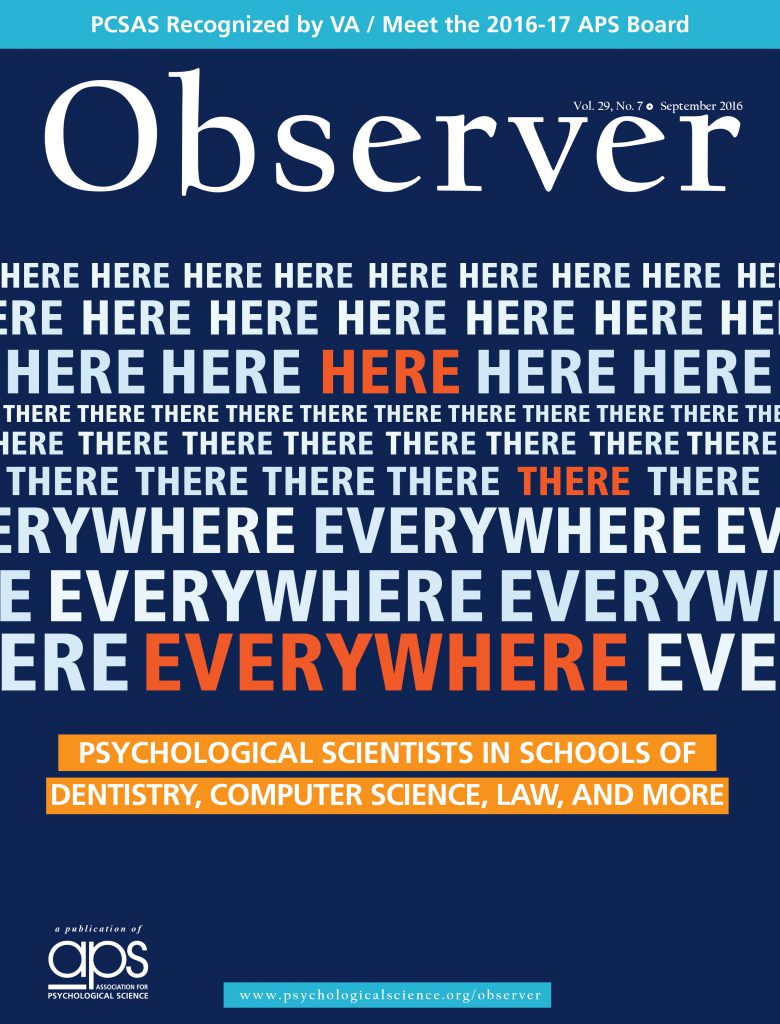
APS Fellow Marita Rohr Inglehart was on the University of Michigan psychology faculty 26 years ago when she was asked to teach a behavioral science course in the university’s School of Dentistry. That led to a research focus on psychosocial and behavioral factors in oral health, and today, Inglehart is a tenured professor in the dental school.
Inglehart is among a distinct group of APS members who have faculty appointments in departments or schools of computer science, music, physics, and other disciplines not obviously associated with the field of psychological science.
Roughly 14% of APS members working in academia are doing so in departments other than psychology, behavioral sciences, social sciences, and the like, an Observer analysis shows. The largest chunk of those members (35%) work in schools of business, management, and marketing, and another 27% are in medical or dental schools. The rest are distributed across disciplines such as computer science, communication, education, law, linguistics, public health, political science, and others.
Some of the assignments should seem logical: Business schools have long been filled with industrial/organizational psychological scientists, and medical schools have increasingly incorporated behavioral curricula into their programs. But other appointments may appear highly counterintuitive — there are psychological scientists in schools of hotel management, optometry, zoology, engineering, music, housing and urban research, international relations, fashion, nutrition, and physics.
Below, several of these psychological researchers discuss their unconventional academic career paths and the scientific perspectives they bring to colleagues and students.
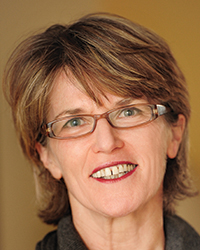 Leonie Huddy
Leonie Huddy
Department of Political Science, Stony Brook University
Our department has an internationally acclaimed specialty in political psychology. My research focuses on the dynamics of public opinion, and I conduct multimethod studies that involve a mix of nationally representative sample surveys, survey experiments embedded in large-scale surveys, and content analysis. I draw on basic intergroup-relations theory and research to examine the influence of gender, racial, ethnic, and political groups on political behavior.
The Department of Political Science at Stony Brook University is unusual. It’s a small niche department that does not cover all subfields of political science, some of which might be at odds with a psychological science approach to the study of politics. Over the years, the department’s focus on political psychology has gained a unique profile, attracting and retaining good faculty and drawing in strong PhD students from both the United States and other countries. Our department has hired a number of psychological scientists, and we typically advertise available positions in both psychology and political science.
I regard my PhD training as excellent preparation for my position, but there are always gaps and cultural differences across academic fields, and I still had to learn how to write for a political science audience. A good political science manuscript requires careful discussion of the political importance of a given set of research findings in addition to its broader theoretical significance. It took time to learn how to do that. The style of writing is also different; editors and readers have less tolerance for jargon. I now greatly enjoy writing in this style (although I may still sound too psychological to some political scientists), but it involved a definite change on my part.
One of the things that I like about working in a political science department is that it allows me to shift my focus away from the micro aspects of a specific psychological process to contemplate larger questions about human nature, social organization, and governance. The downside is that it is more difficult to keep up with developments in psychology, which is a large and productive field. The absence of diverse psychology colleagues makes it more difficult to follow the latest research in various subfields of psychological science. It is also difficult to regularly attend major conferences in several subfields, and that means often waiting until research is published to learn of cutting-edge or new research developments.
But the work here provides a common topic of discussion for the faculty members, a disproportionate number of whom are political junkies. Thus, as a side benefit, I am also better politically informed than I might be otherwise.
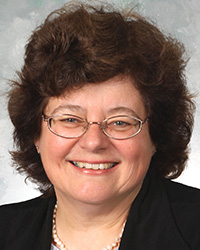 Marita Rohr Inglehart
Marita Rohr Inglehart
University of Michigan School of Dentistry
I was on maternity leave in 1990 when the dental school administration contacted the department of psychology to find a replacement for their behavioral science instructor, who had to leave her job suddenly. Our department chair recommended me because I previously had taught courses at the medical school. I taught one course, then another, and now I am a tenured professor in the dental school (and an adjunct professor in the psychology department) and love my work there.
I am in the periodontology and oral medicine department. My research focuses on the role of psychosocial factors in patients’ oral health and oral-health-related behavior as well as in interactions between patients and dentists. I teach three courses and coteach one course for predoctoral dental students, one course for dental hygiene students, and one course for orthodontic residents per year. The material I cover is concerned with ensuring that students become patient-centered, culturally competent dentists and dental hygienists who are interested in collaborating with other health professionals such as psychologists when providing care for their patients. Mentoring junior colleagues and students for their research activities is probably the biggest contribution I make to our school.
The biggest benefit to working in the school of dentistry is that I can introduce my dental colleagues to psychological insights they might otherwise not consider. The Commission on Dental Accreditation requires all graduates to be competent in behavioral-science-related issues of care, so my teaching is crucial to ensure that this accreditation standard is being met. The biggest drawback to working in this department is that it is difficult to keep up with the field of psychology because I am so strongly involved in dentistry-related research.
Behavior plays a huge role in preventing oral health issues such as periodontal disease and caries. Much of my work therefore focuses on prevention of oral disease, including engaging students in tobacco-cessation counseling. A new trend in dentistry and medicine is to include patient-centered outcomes, such as assessments of
oral-health-related quality of life or patient satisfaction with treatment, in research studies. My colleagues appreciate my collaboration in this area.
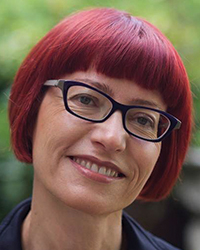 Olga Kostopoulou
Olga Kostopoulou
Department of Surgery and Cancer, Imperial College London, United Kingdom
After my first postdoctoral appointment in a psychology department, I became an assistant professor of behavioral sciences at a medical school. I lectured on medical error, the role of cognitive biases, risk perception, and risk communication in medical decisions. During this post, I obtained a national research fellowship to study adverse events in primary health care. This award helped me develop my research on medical error, obtain further research grants, and establish a career as a psychologist working in a medical academic environment.
My interest in human error and especially medical error made the transition from a psychology to a medical department plausible. In fact, after my first postdoc, I was contemplating leaving academia, as I found the research process too drawn out and removed from real life. I am much happier when research moves in a bidirectional way, from the lab to the ecology and back to the lab, but always with an eye on the ecology.
I study judgment and decision-making applied to health care. My aim is to apply psychology theory, methods, and findings to the study of medical decisions by professionals and patients. I have conducted research in different health care contexts and have led a number of projects on medical judgment and decision support.
I employ psychology postgraduates and supervise psychology PhDs. My current PhD student is studying the role of predecisional information distortion in medical diagnosis. My current postdoc has a PhD in neuropsychology and is working with me on a project that uses signal detection theory to study misdiagnoses.
The biggest benefits to working in a medical school are access to populations of interest (i.e., physicians and patients); knowledge about research gaps and needs, which is important for obtaining research funding; and the opportunity to do research that is likely to have an impact on patients and their care. A drawback is the lack of easy access to psychological scientists from similar areas with whom to exchange ideas and learn about the latest theoretical and methodological developments. Going to conferences, being a member of scientific societies of relevance (APS, the Society for Judgment and Decision Making, the European Association for Decision Making, and the Society for Medical Decision Making, in my case), and collaborating with other psychologists are some ways to compensate for this, as is disseminating your work to colleagues who would never otherwise get to hear about it.
Another drawback is the expectation to publish in high-impact-factor journals, which is the norm for most medical journals. Publications in journals with an impact factor of less than 3 to 5 (as most psychology journals are) may be omitted from a medical school’s submission to the Research Excellence Framework, which can disadvantage an individual seeking promotion.
It is encouraging that behavioral sciences have become more prominent in medicine in the last 15 years because of health psychology and, more recently, “nudging” and behavior change. Nevertheless, psychological scientists still have a long way to go to have their contributions acknowledged as those working in more traditional disciplines such as genetics, molecular biology, and epidemiology.
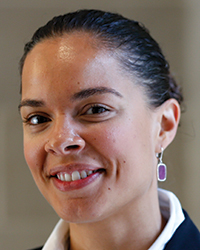 Destiny Peery
Destiny Peery
Northwestern University Pritzker School of Law
I research and teach at the intersection of race, psychology, and law. I’m an experimental social psychologist by training (I also have a law degree), and I research how people perceive and categorize individuals and situations — particularly identities and situations involving racial stereotyping, prejudice, and discrimination. My projects include investigating how the law defines race and its relationship, or lack thereof, to the psychology of how people process racial cues (e.g., ancestry, appearance, self-identification). I also have a project on how social psychological theories about differences in perceptions of discrimination affect the decisions of judges from different social-identity groups — for example, male versus female judges — in real discrimination cases. Fundamentally, I’m interested in how social psychology can check, validate, and/or correct the assumptions that the law and legal professionals make about human behavior and cognition.
My interest in psychology came first, and I declared my major in psychology as a first-semester freshman in college. In my sophomore year, I began work on a project investigating whether or not hate crime laws reflected lay understandings of hate crimes. That work became my senior research project. I also did a summer research fellowship at the American Bar Foundation, a sociolegal research organization, where I worked with JD/PhD social psychologist Shari Diamond on a project involving jury decision-making. It was during that summer that Diamond encouraged me to consider a joint-degree program because of my interest in law and policy. I was admitted to the JD/PhD program at Northwestern, and I felt that I couldn’t turn down the opportunity.
When I applied for work in my last year of graduate school, I applied to both psychology and law positions, and I chose a fellowship at the Duke University School of Law. I spent 2 years at Duke, and in my second year I again applied for jobs, this time seeking tenure-track positions in psychology departments and law schools. I wasn’t sure how competitive I would be on either market. I was not successful on the psychology market, but I did extremely well on the law school market — so here I am in a tenure-track position in a law school, and it has proven to be a very good fit.
One challenge of being outside of a psychology department is that most, if not all, of my colleagues do not share my methodological orientation. That adds a challenge to presenting work because it becomes a translational exercise that wouldn’t be required in a psychology department. Sometimes my colleagues will question or challenge my basic methodological orientation in ways that I wouldn’t encounter in a psychology department.
Another drawback is the lack of infrastructure to support experimental research. Law schools are not full of experimentalists who are accustomed to having labs, research assistants, and graduate students, so the logistics of research can be more challenging. It requires more creativity, a supportive administration, and possibly more initiative to acquire outside funding.
But I have really come to appreciate the interdisciplinary nature of my position at a law school. I can publish in psychology journals, law reviews, and law and policy journals. I can do experimental work. I teach law, but I can bring psychology in where it’s relevant. In addition, I’m exposed to a lot of interesting work done from a variety of perspectives and grounded in areas of law and social science that I would not be exposed to otherwise.
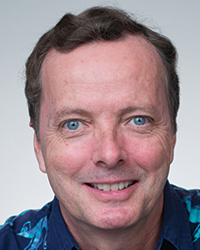 Scott Robertson
Scott Robertson
Information and Computer Sciences Department, University of Hawai’i at Manoa
My work is in the area of human–computer interaction (HCI). HCI researchers are concerned with the design and use of interactive computing systems, and more broadly with their impact on individuals and society. When I began my career, the field of HCI was just getting started. The Association for Computing Machinery was having its first conferences in an area they called “Human Factors in Computing Systems,” and those conferences initially were dominated by psychologists and a smattering of computer scientists. Although it was a promising area for the future, there were not many job titles consistent with it at the time, especially in academia. My first jobs were in psychology departments, but those were not good fits for me. I left academia for the computing and communications industry, where I was a much better fit. This allowed me to grow with the field. Then, the department at the University of Hawai’i at Mānoa was seeking HCI expertise at the same time that I was seeking a new job. Kismet!
Most recently, I’ve been researching how people use social media and new media to understand political issues and to participate in civic life. In prior jobs, I’ve also studied how mobile devices might work together with televisions, how programmers could learn from an intelligent-agent-based tutoring system, how a knowledge-management system might be designed to support library research, and how people do predictive answering of questions as they are reading them.
My research allows me to participate in the unbelievably fast-paced realm of computing technology. It allows me to think about future technologies that are relevant to human experience and behavior, such as wearable technology, the Quantified Self, augmented perception and cognition, social media, and civic well-being. It keeps me in contact with other academic and corporate researchers engaged in a hugely diverse realm of activities. I feel privileged to be able to bring people’s perspectives into the domain of technology design and development, and maybe make a difference in how our highly technologically mediated society develops.
I also get all of the interesting students to work with. Right now, I am advising a graduate student who is designing a system for scripting animatronic puppet shows. This is not core computer science, but it is certainly interesting, and there are many HCI-related issues. My most recent advisee just completed a dissertation that examines how people use social media while simultaneously watching political debates. Again, it’s more like psychology than computer science, but really it involves both. A computer science department without a behavioral scientist would not be able to support these interesting projects.
It’s difficult to convince others that behavioral science is important to computer science. I am lucky that my colleagues at the University of Hawai’i “get it,” but for computer science students it is often a struggle. I have the challenge and pleasure of explaining why the computational and
social-behavioral sciences should not be so separate.
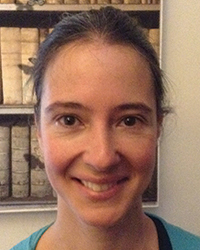 Renee Timmers
Renee Timmers
Department of Music, University of Sheffield, United Kingdom
I earned my master’s degree in musicology from the University of Amsterdam, the Netherlands, and my PhD in psychology from Radboud University, the Netherlands, where I was a member of the “Music Mind Machine” research group. I worked with two other PhD students who had backgrounds in psychology and computer science. We combined our expertise to conduct interdisciplinary research. Afterward, I was a postdoctoral researcher in music, psychology, and computer science departments in Europe (and once in the United States) before settling down at the Department of Music at Sheffield. This department has a strong tradition in the psychology of music, which makes it a suitable place to work.
I’m interested in communication and expression in music performance. My aim is to get insight into what musicians do when performing music, and, on the other hand, what their contribution is to the listeners’ experience. I mostly do
behavioral–experimental research, including recording performances under varying conditions (e.g., performing at different tempi or with different expressive intentions), measuring performance aspects (e.g., timing and dynamics), and collecting listeners’ responses to performed music. I also investigate cross-modal correspondences between sound and other modalities and the role they play in perceiving and making sense of performed musical sounds, the perception and expression of emotion through music, and processes responsible for emotion induction.
Currently, my focus is oriented toward communication among performers in ensemble contexts. With collaborators in York, Leeds, and Sheffield, we’re investigating temporal
coordination in sound and visual gestures in vocal ensembles, with special emphasis on barbershop singing. We also will look at social aspects of such coordination, including emerging practice strategies and patterns of communication in rehearsals. At the moment, however, I am on sabbatical for 5 months in Sydney, Australia, where I collaborate with people from the MARCS Institute for Brain, Behavior, and Development (Peter Keller, Manuel Valera, and Jennifer McRitchie) on a project investigating the role of cross-modal information in duo-performer synchronization. We will use transcranial magnetic stimulation to test the role of particular brain areas related to motor simulation and audio-visual binding. We will recruit pianists whose task is to synchronize with a video-recorded pianist. Participants will hear the recorded sounds and see the hand movements of the video-recorded pianist; this will be compared to a condition in which participants will hear the sounds but see an abstract visualization of the hand movements (i.e., a moving dot) rather than the actual hand. The degree of motor simulation and audio–visual integration across conditions will be compared.
Relatively speaking, there is a good proportion of students interested in music psychology within a department of music, particularly in an academically oriented department such as in Sheffield. The master’s programs attract students from across the globe with an interest in the psychology of music, and many of these students are interested in continuing this direction of study through PhD research. In other words, there is no shortage of work.





Comments
It’s wonderful to see diverse roles for psychological scientists being highlighted. Dr. Inglehart is an important contributor in the field of Behavioral Dentistry. She has helped to export psychological science to the realm of oral health.
APS regularly opens certain online articles for discussion on our website. Effective February 2021, you must be a logged-in APS member to post comments. By posting a comment, you agree to our Community Guidelines and the display of your profile information, including your name and affiliation. Any opinions, findings, conclusions, or recommendations present in article comments are those of the writers and do not necessarily reflect the views of APS or the article’s author. For more information, please see our Community Guidelines.
Please login with your APS account to comment.